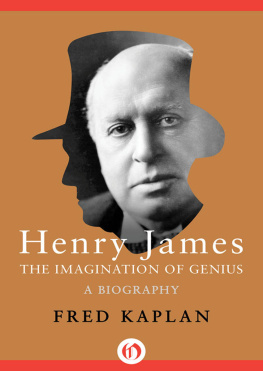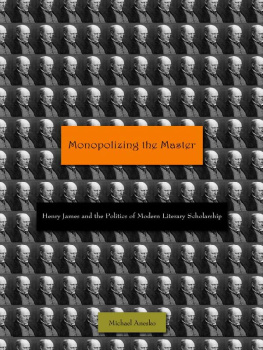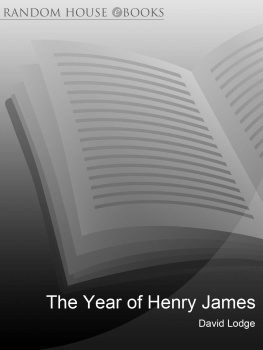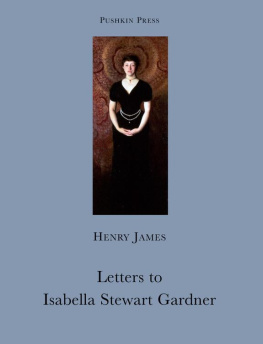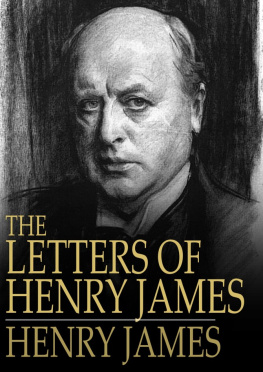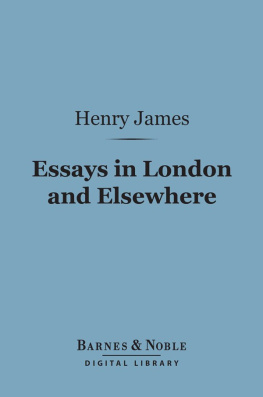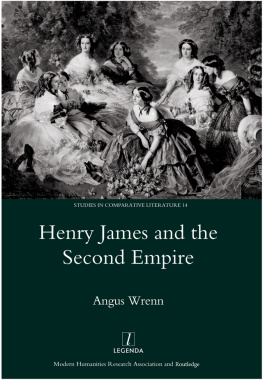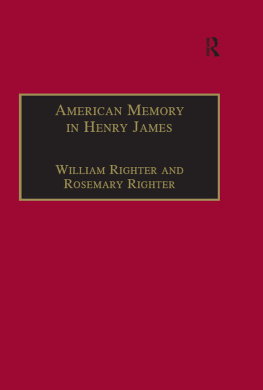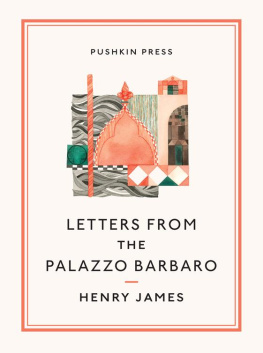Henry James
The Imagination of Genius
Fred Kaplan

For Rhoda
One
REMEMBERED SCENES
18431855
( 1 )
As the brutal Civil War in America came to an end, a young American, slim, handsome, dark-haired, of medium height, with sharp gray eyes, began to write stories. By the literary standards of his time, he had a plain, direct style. He wrote in the alcove of a yellow-toned sunlit room in Cambridge, Massachusetts, where he pretended to study law. He had not fought in the war. His two younger brothers were soldiers, still engaged in the most massive conflict since Napoleon had made Europe his empire. The twenty-one-year-old Henry James, Jr., preferred to be a writer rather than a soldier. His motives for writing were clear to himself, and they were not unusual: He desired fame and fortune. Whatever the additional enriching complications that were to make him notorious for the complexity of his style and thought, the initial motivation remained constant. Deeply stubborn and persistently willful, he wanted praise and money, the rewards of the recognition of what he believed to be his genius, on terms that he himself wanted to establish. The one battle he thought most worth fighting was that of the imagination for artistic expression. The one empire he most coveted, the land that he wanted for his primary home, was the empire of art.
( 2 )
On a summer day in 1872, when the shadows began to lengthen and the light to glow, twenty-nine-year-old Henry James, Jr., now
( 3 )
In December 1915, an elderly, thick-figured, clean-shaven Henry James lay on his deathbed in his apartment in London. The cannons of war had exploded in his consciousness the previous year with the devastating force of memory and betrayal. The beautiful young men of his English world were being obliterated on the battlefields and in the trenches. The flames exploding from the artillerys percussion flared also with the glow of the rockets red glare of his American childhood. Various fires, some public, some personal, possessed much of the past and the present: the fire of his fathers burning leg in a childhood accident; the fire in Newport during the Civil War, when, as a volunteer fireman, he had wrenched his back so badly that the pain became for him a representation of his own need to have a wound; the flames of the night in 1863 when one of his younger brothers had been wounded in the assault on Fort Wagner; the steady, stubborn fire within himself that expressed his ambition for fame and money; the conflagrations in his fiction, especially the burning of the spoils of Poynton, anticipating what the fires of war were to destroy fifteen years later; and the small domestic fires at Lamb House, his home in Rye, on the grate of which he had periodically over the years burned stacks of all the personal letters he had received.
Six years of frequent illness had pushed him into nervous and physical
( 4 )
The son of a loving, realistic mother and a talented, impulsive father, Henry James, Jr., was born in Greenwich Village on April 15, 1843. New York was the city of his childhood. Later, vastly transformed, it became one of the sometimes attractive but always fearful cities of his imagination. For him, the citys transformation epitomized the change from the mid-Victorian era of his childhood to the modern world of his adult years. He was to remember it with affection and pleasure. These accelerating changes to New York and to the rest of what he thought of as the civilized world occasioned his regret and sometimes his deep pain. He did not easily take to change, especially when it threatened values and ways of life that he believed had permanent value.
He was born into a Presbyterian family that had been for generations committed to Calvinism and to business. His mothers maternal grandfather, Alexander Robertson, left Reading Parish, near Edinburgh, for New York City in the mid-eighteenth century. His mothers paternal grandfather, Hugh Walsh, emigrated about 1770 from Killingsley, County Down, Ireland, to Philadelphia and then to Newburgh, New York. Her mother, born in 1781, was named Elizabeth, the tenth child of Mary and Alexander Robertson. She married James Walsh, a marriage that produced six children, four sonsthe young Henrys maternal unclesand two daughters: Mary, Henrys mother, born in 1810; and Catherine, his much-loved Aunt Kate. On the paternal side, the record is less defined. His grandmothers parents were John and
The Irish and Scotch ancestry is definitive. There seems not to have been a drop of English blood in the families. Nor of artistic blood. The Robertson and the James families directed themselves to business, particularly to trade and real estate. The emigrations from Scotland and Ireland had been motivated mostly by the economic fluctuations that periodically brought recession and depression to the linen trade and to agriculture. The collapse in the market for Irish linen had sent Alexander Robertson to New York, where he flourished as a merchant, his business and his home in lower Manhattan. Combining patriotism with profits, Hugh Walsh had first prospered through contracts to sell provisions to the Continental Army, and then as a general merchant and ship-line owner. But the Robertson and the Walsh fortunes were modest, especially since the patriarchs had eleven and nine children respectively. Mary Robertson Walsh James inherited a minor amount, which had been reduced to even less by the time of her death in 1881. The Barber family seems to have prospered also, Catherines father a farmer of great respectability and considerable substance. It was their son-in-law, though, who became such a phenomenon of commercial success that he provided his family with one of the first great American fortunes.
In 1789, the year in which the American Constitution was created, William James emigrated from County Caven, where he had been born in 1770. For the ambitious young businessman, America was a land where Irish antagonism to England made it easy to be a patriot. The revolutionary war forged a national consciousness that he could immediately share. Opportunities readily repaid ingenuity and hard work. William James traveled northward up the Hudson Valley to Albany, where he worked for two years as a merchants clerk. With his own stake, he became a tobacco merchant on a small scale; then he expanded into produce. By 1800, he had opened two more stores. Then he bought ships to move his produce up and down the river. He devoted himself to business, as high a calling in his own eyes as it was in the eyes of his community, and of his Presbyterian God.
Marrying in 1796, his first wife died within a few months of giving birth, in the spring of 1797, to twin sons. William married again, in 1798, this time to the daughter of a wealthy Irish Catholic landowner. His second wife gave birth to a daughter the next year and died soon afterward. In 1803, he married twenty-one-year-old Catherine Barber. They had ten childrenHenrys paternal aunts and uncles, and, of
What happened to the money, the admirable three millions, the loss of which was a haunting wonder to Henry James, Jr? His grandfather had had a genius for earning and investing money, but his children had a talent only for dissipating what he left them. Like many nineteenth-century millionaires, William James made children with the same regularity with which he made money. At his death, there were twelve major heirs. Through death and voluntary exclusion, he had no heirs with an interest in business. Neglect and incompetence resulted in the investments not being protected effectively. The heirs all lived on the interest of the inherited capital, and often enough on the capital itself. The rupture with my grandfathers tradition and attitude was complete, his grandson was to write toward the end of his life, trying to make sense of what had happened to the family money. We were never in a single case for two generations, guilty of a stroke of business. In a volatile economic world, money that did not grow, shrank.

